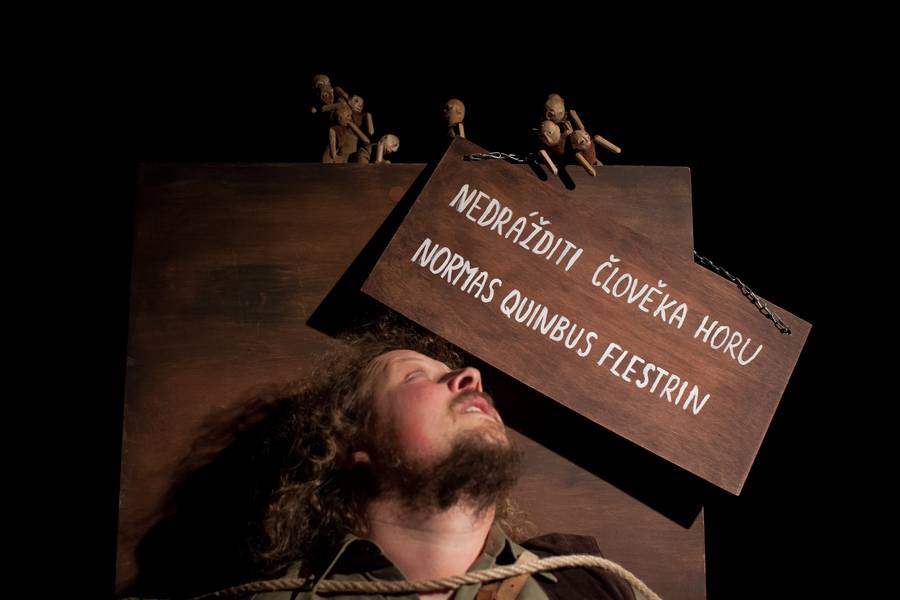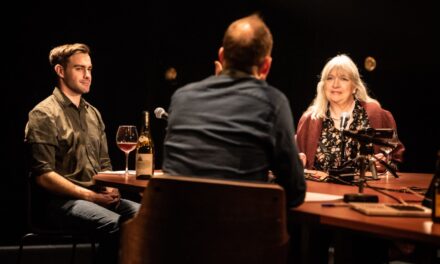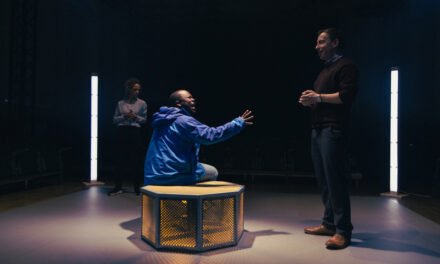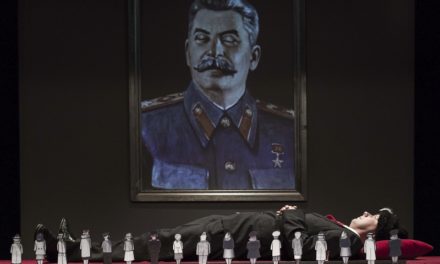“The life of man to represent, And turn it all to ridicule, Wit did a puppet-show invent…”,- Anglo-Irish writer-satirist, essayist, philosopher, poet, owner of one of the sharpest feathers in the cap of world literature Jonathan Swift. Is it any wonder that one of his most famous works, Gulliver’s Travels, has found popularity in the marionette theatre. Gulliver’s Travels is an abbreviated title and in a play aimed at children, Swift’s novel appears in a very stripped-down and philosophically devoid form, but it serves as an excellent primer for young minds on the perception of satire. At least, this is how simultaneously childlike and satirically sharp the version of Gulliver’s Travels retold and staged by Jiří Hajdyla at the Těšínské Theatre in Český Těšín as part of BAJKA Puppet Theatre is. I would like to remind you that this unique theatre has three venues – Czech, Polish and children’s. This is a play about the feat and art of being different, different and alien, and about what the road of ignorance, hypocrisy and pride can lead to.
The program of the 10th edition of the Madách International Theatre Meeting (MITEM), which is an echo of the International Theatre Olympiad, seems to be diverse and varied, but in fact, it is calibrated and stylistically very precise. There are dramas, documentary stories, plays based on films, classics, experimental contemporary drama, and even puppet theatre… However, through this whirlwind of theatre flows the cross-cutting theme of multiculturalism and respect for individuality in all its manifestations. Non-acceptance of non-acceptance. Harmony and unity of the different. Gulliver’s Travels, albeit in a simplified children’s format, continues this line.
Gulliver’s magical adventures have been captivating the imagination of readers for centuries. In the puppet theatre, the play with scale and transformations looks especially spectacular. Director Jiří Hajdyla tried to create a performance that would be interesting and understandable for children, but that would not bore adults either. He succeeded, and the key to the fascinating stage action was Jonathan Swift’s satire. The director was aware that the main audience of the performance better perceives bright colors rather than halftones and rightly decided that the satire used in the performance should be as simple and understandable as possible. The most dynamic and catchy moments have been chosen from the large work, which divides the play into four parts according to the number of four fairytale countries visited by the protagonist: the country of Lilliput, where ruthless tiny creatures live, the country of Brobdingnag, inhabited by giants, the country of Laputa, where dreamers and madmen live, and the country of Houyhnhnms, where wise horses live. Each of Gulliver’s fascinating journeys gave an opportunity to present different types of puppets in the performance: marionettes, mannequins, and masks.
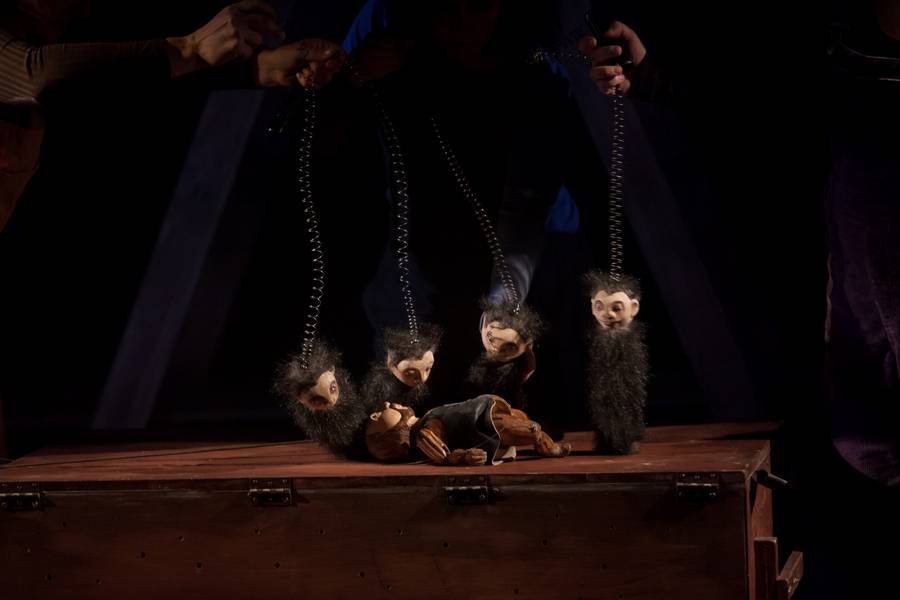
Photo Courtesy of the 10th Madách International Theater Festival.
While children are mesmerized by the performers’ dexterity, adults have much to ponder. Swift hides his satire behind a veil of fantasy, and it is only when we look closer that we see the mirror he holds up to society. Lilliputians may be tiny, but their capriciousness and cruelty easily match the extremes humans are capable of. Talking horses may seem like humorous characters, but they spend their days actively creating a slavish totalitarian regime. Again and again, the worlds Gulliver visits and the creatures he meets embody the worst of human nature and society, and Swift is so accurate in his images that they strike both fantasy and reflect reality. Moreover, not the reality of 1726, but of 2024.
The play raises the problem of the depravity of society. People have forgotten what it means not to fight, to do good, and to be sensible. Jonathan Swift’s work is an illustration of the fact that the world is diverse and incomprehensible, people still have to unravel the meaning of the universe. Meanwhile, an imperfect and weak man has a gigantic conceit and considers himself a superior being, but not only can not know everything but often risks becoming worse than animals. Many people have lost their humanity by inventing weapons, quarreling and deceiving. Man is petty, cruel, stupid and ugly in his behavior. The main idea of the play is the need to correct society through consistent rejection of the vices of ignorance. The hour-long theatre lesson for children and adults turns out to be not only fascinating and entertaining but also extremely topical. Children’s questions are often the most difficult. Here an adult book is translated into children’s language and this simplification, in fact, exposes the globally important plethora of society’s moral issues, which we have not said goodbye to since Swift’s time.
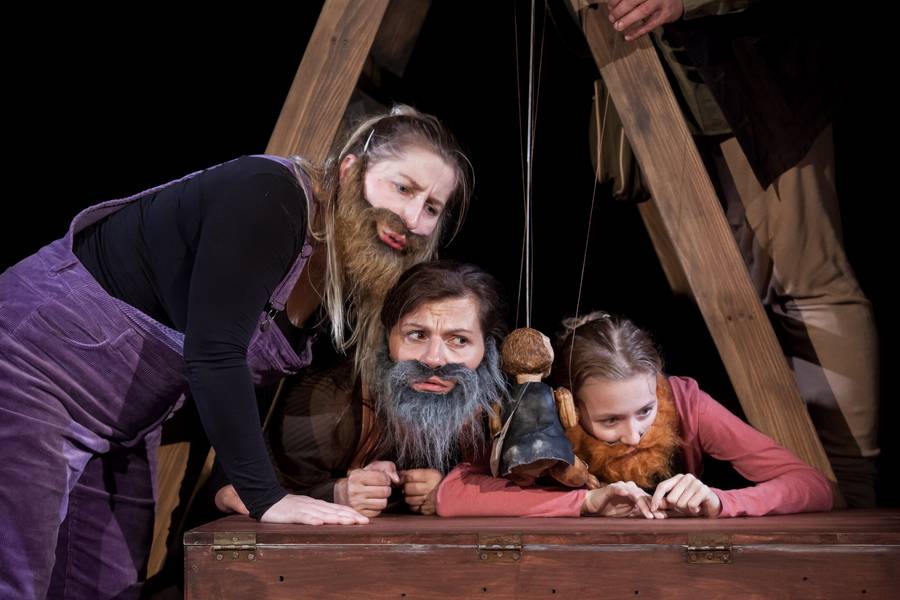
Photo Courtesy of the 10th Madách International Theater Festival.
There are hidden subtexts in this seemingly childish play. The main one is society’s inability to understand and accept people who are different. Swift wrote about it in the 18th century, and we are talking about it nowadays. Considering ourselves the crown of creation, we, sometimes, willingly or unwillingly, live our lives as puppets in the hands of higher powers. And that’s why looking at the puppet show we look at ourselves from the outside. Let there be no hints, puns and parodies, understandable only to adults, but the memories of the read book, which the performance brings to mind, revive them in the memory.
One of the successful artistic methods of the performance is working with the spectator’s optics, playing with scales and perspectives. Simultaneously with the puppets, people are on stage, and Gulliver himself appears as a man and a puppet, which gives additional meanings to what is happening.
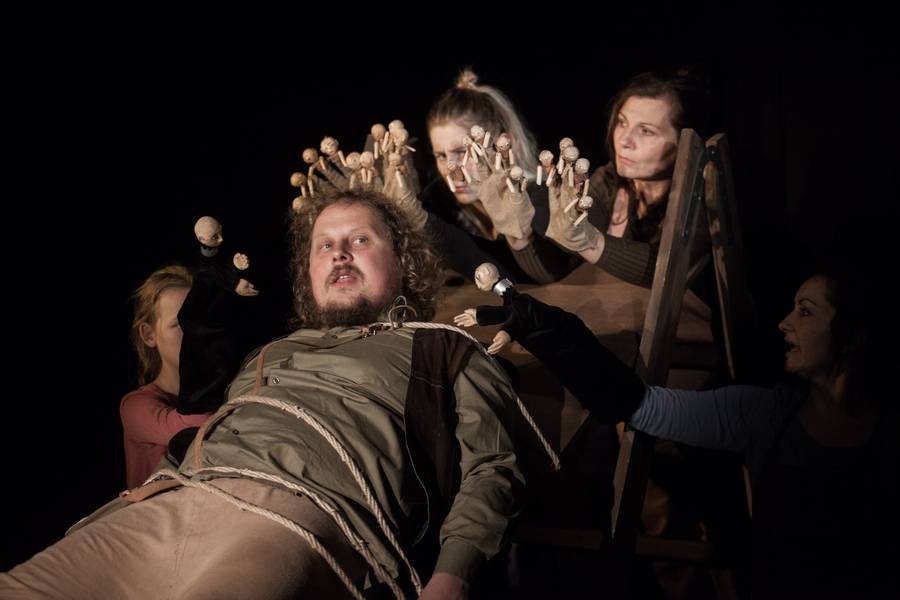
Photo Courtesy of the 10th Madách International Theater Festival.
From the shipwreck to the return to his homeland the wanderings of Gulliver continued and in the finale of the book felt entirely disappointed in people. I would like to believe that all of us today, living in the era of shipwreck or in exile, once we return to our homeland, will keep our faith in mankind, in ourselves, in light. And theatre contributes to this, not allowing us to be discouraged. 10th MITEM turns out to be the best theatre journey because there are neither giants nor midgets, but everyone is equally big and interesting. There are neither low genres nor high genres, there is no top-down look at the audience and bottom-up look at the “immutable foundations of art”, but there is theatre, and that means hope!
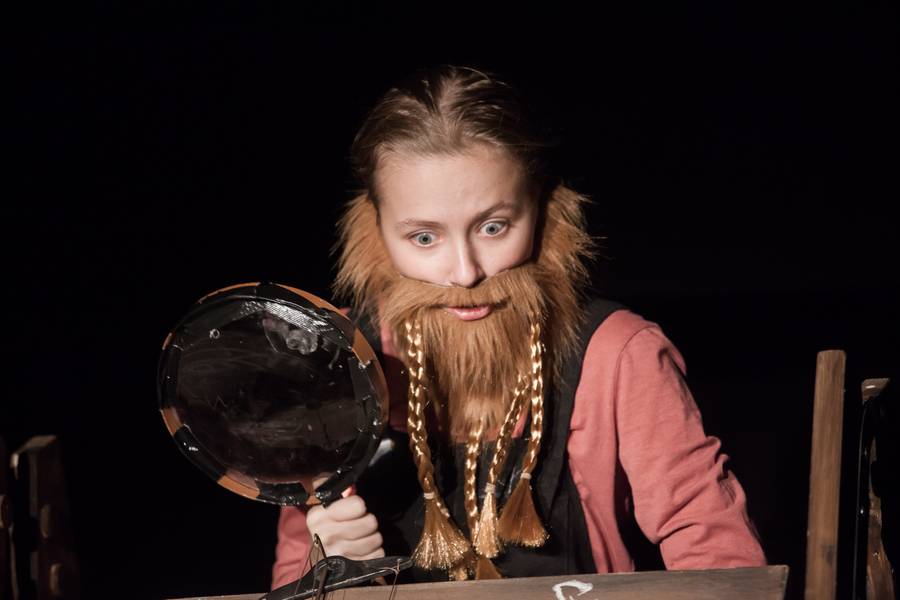
Photo Courtesy of the 10th Madách International Theater Festival.
This post was written by the author in their personal capacity.The opinions expressed in this article are the author’s own and do not reflect the view of The Theatre Times, their staff or collaborators.
This post was written by Emiliia Dementsova.
The views expressed here belong to the author and do not necessarily reflect our views and opinions.

